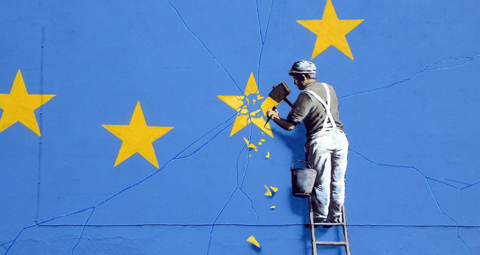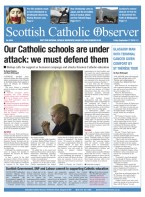BY Peter Diamond | January 18 | ![]() 0 COMMENTS
0 COMMENTS ![]() print
print

Church urges EU citizens to prepare for Brexit
The Church is urging EU citizens living in the UK to register under the government’s settlement scheme in order to remain in the country after Brexit.
The call by the Bishops of England and Wales for priests and schools to inform EU citizens of the scheme has been echoed by one of Scotland’s specialist immigration lawyers Jamie Kerr.
Official statistics show that more than half of all EU nationals living in Scotland identify as Roman Catholic, meaning the impact of Brexit will affect parishes and dioceses across Scotland.
Mr Kerr, a parishioner of St Francis Xavier’s parish in Carfin, said the Church should be encouraging people to register for the scheme.
He said he has been advising employers to tell their EU migrant workers to register for the scheme and that the Church should be advising its foreign priests and Religious of the same.
“For the Church I think there is naturally a very civic role to play here to give direction to Europeans who go to Mass who may not know they need to apply,” he added. “I think it’s appropriate for the Church to remind these people to apply for the status.”
‘Greater awareness’
Mr Kerr said that since the enlargement of the EU in 2004, there has been ‘a greater awareness among many of the impact that recent migration from continental Europe has had on our domestic Church here in Scotland.’
Mr Kerr said: “It’s hard to navigate because we’ve never had a system like this and there are people alive today from countries like Poland who came here after the war, raised their families, paid their taxes and they now need to apply for status,” he said.
“It makes them feel unwelcome because they are reminded they are a migrant.
“Of course the Home Office say it’s straightforward but there is always a risk when applying for something that it won’t be granted it.”
Freedom of movement
The initial settlement scheme is due to open in March 2019. Freedom of movement of EU citizens will continue into 2020 and the settlement status scheme will close on June 30, 2021.
Mr Kerr says there is a risk the system will become a mess if EU citizens do not settle their status before June 2021.
“After June 2021 the scheme will become mandatory for new migrants and there is a risk that people who are here now will delay applying for the scheme,” he said.
“So there could likely be a rush as it closes in 2021 and the Home Office isn’t able to process all the forms and it will become a bit of a mess.”
“There will also be individuals who will be none the wiser about the scheme because it’s too complex or they have problems registering, as they have no access to the internet.”
Many EU citizens in the UK come from Catholic-majority countries. Of the 3.7 million EU citizens living and working here, the biggest group come from Poland, estimated at one million.
Christian influence
A spokesperson for the Church in Scotland said: “In a period of considerable uncertainty, the enduring teachings of the Church offer an opportunity for reflection and the possibility of hope for the future.”
“As Christians, it is our responsibility to do all we can to influence politics for the better and to work for the Common Good of all people in society, particularly the most vulnerable.”
Bishop Paul McAleenan, Auxiliary Bishop of Westminster Diocese, said the issue was of ‘special pastoral concern for us’ as the majority of EU citizens in the UK were Catholic.
The Church has previously described the UK government settlement scheme as ‘unjust and divisive’ and said the fees charged were ‘unprincipled,’ however it has nevertheless asked Catholic bodies to bring it to ‘the attention of all those who need to avail of it.’
Since the 2016 referendum, many had ‘faced profound uncertainty and insecurity about their future,’ he added.
“While this is an important step we understand that, especially for people who have contributed to our society over many years, it may feel unjust and divisive that they are now require to apply for permission to stay,” Bishop McAleenan said.
“We think it’s imperative that people are given the opportunity to remain legally in the country. We want to make sure the message goes out to EU citizens to apply.”










